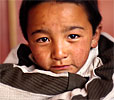How the Well-Baby Program Supports Healthy Child Development

Check out our blog for social-emotional learning articles, news, and more!
 Jones, K., Daley, D., Hutchings, J., Bywater, T., & Eames, C. (2007). Efficacy of the Incredible Years basic parent training programme as an early intervention for children with conduct problems and ADHD. Child: Care, Health And Development, 33(6), 749-756.
Jones, K., Daley, D., Hutchings, J., Bywater, T., & Eames, C. (2007). Efficacy of the Incredible Years basic parent training programme as an early intervention for children with conduct problems and ADHD. Child: Care, Health And Development, 33(6), 749-756.
Attention Deficit Hyperactivity Disorder (ADHD; American Psychiatric Association [APA], 1994) is characterised by developmentally inappropriate levels of inattention, impulsivity, and over activity (APA, 1994; Barkley, 1997). These problems typically emerge in early childhood, are relatively persistent, and result in cross-situational impairment (e.g. at home and at school; APA, 1994). The current Diagnostic and Statistical Manual of Mental Disorders (4th ed; DSM-IV) specifies three subtypes of ADHD: predominantly inattentive subtype; predominantly hyperactive/impulsive subtype; or combined subtype. Problems must be evident in two or more settings (e.g. home and school), and the child must show significant impairment in social, school, or work functioning (APA, 1994; 2000). Prevalence estimates indicate that between 3-6% of school-aged children meet diagnostic criteria for ADHD (APA, 1994; 2000; Szatmari, 1992).
Left untreated, the long-term prognosis for these children is poor. Children with ADHD are at a much greater risk of experiencing problems in the educational, personal and social domains (Daley, 2006). Children with ADHD are also at a heightened risk of developing conduct problems, substance abuse, and interpersonal and occupational difficulties that can persist into adulthood (Manuzza et al., 1991; Taylor et al., 1996).
Findings from this study indicate that the Incredible Years Parent Training programme is a valuable intervention for many pre-school children displaying early signs of ADHD.





